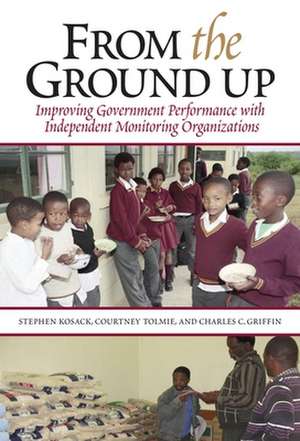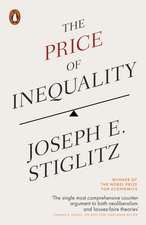From the Ground Up: Improving Government Performance with Independent Monitoring Organizations
Autor Stephen Kosack, Courtney Tolmie, Charles C. Griffinen Limba Engleză Paperback – 11 mar 2010
This book is based on a simple concept: no one is in a better position to hold a government accountable than those it governs.
When governments fail to meet the needs of their citizens, the international community often turns to large external organizations such as the International Monetary Fund or the World Bank. These analysts and monitors may have the resources and expertise to analyze and advise on public spending and governance, but where do they go when the time comes to implement new policies? And can they really have a more nuanced understanding of the country's problems than its own citizens? Who is there to watch day and night to hold the government accountable?
From the Ground Up proposes that the international community's efforts to improve public expenditure and budget execution decisions would be more effective if done in collaboration with local independent monitoring organizations. Stephen Kosack, Courtney Tolmie, and Charles Griffin track the work of sixteen independent monitoring organizations from across the developing world, demonstrating how these relatively small groups of local researchers produce both thoughtful analysis and workable solutions. They achieve these results because their vantage point allows them to more effectively discern problems with governance and to communicate with their fellow citizens about the ideals and methods of good governance.
The authors also outline some disadvantages facing independent monitoring organizations, such as insufficient resources, inadequate access to data, and too little influence with high government officials. Collaboration with larger international organizations could help independent monitoring organizations overcome such obstacles, increasing their chances of improving governance—from the ground up.
When governments fail to meet the needs of their citizens, the international community often turns to large external organizations such as the International Monetary Fund or the World Bank. These analysts and monitors may have the resources and expertise to analyze and advise on public spending and governance, but where do they go when the time comes to implement new policies? And can they really have a more nuanced understanding of the country's problems than its own citizens? Who is there to watch day and night to hold the government accountable?
From the Ground Up proposes that the international community's efforts to improve public expenditure and budget execution decisions would be more effective if done in collaboration with local independent monitoring organizations. Stephen Kosack, Courtney Tolmie, and Charles Griffin track the work of sixteen independent monitoring organizations from across the developing world, demonstrating how these relatively small groups of local researchers produce both thoughtful analysis and workable solutions. They achieve these results because their vantage point allows them to more effectively discern problems with governance and to communicate with their fellow citizens about the ideals and methods of good governance.
The authors also outline some disadvantages facing independent monitoring organizations, such as insufficient resources, inadequate access to data, and too little influence with high government officials. Collaboration with larger international organizations could help independent monitoring organizations overcome such obstacles, increasing their chances of improving governance—from the ground up.
Preț: 200.51 lei
Nou
Puncte Express: 301
Preț estimativ în valută:
38.37€ • 40.16$ • 31.93£
38.37€ • 40.16$ • 31.93£
Carte tipărită la comandă
Livrare economică 31 martie-14 aprilie
Preluare comenzi: 021 569.72.76
Specificații
ISBN-13: 9780815704126
ISBN-10: 0815704127
Pagini: 118
Ilustrații: black & white tables, figures
Dimensiuni: 152 x 229 x 10 mm
Greutate: 0.2 kg
Editura: Brookings Institution Press
Colecția Brookings Institution Press/Ash Center
ISBN-10: 0815704127
Pagini: 118
Ilustrații: black & white tables, figures
Dimensiuni: 152 x 229 x 10 mm
Greutate: 0.2 kg
Editura: Brookings Institution Press
Colecția Brookings Institution Press/Ash Center
Notă biografică
Stephen Kosack is a lecturer in development management at the London School of Economics. He is a former research fellow in Global Economy and Development at the Brookings Institution.
Courtney Tolmie is a senior program officer for the Transparency and Accountability Program, a project of the Results for Development Institute.
Charles C. Griffin is senior adviser to the vice president for Europe and Central Asia at the World Bank and was previously a senior fellow in Global Economy and Development at Brookings.
Courtney Tolmie is a senior program officer for the Transparency and Accountability Program, a project of the Results for Development Institute.
Charles C. Griffin is senior adviser to the vice president for Europe and Central Asia at the World Bank and was previously a senior fellow in Global Economy and Development at Brookings.
Descriere
A Brookings Institution Press and Ash Center for Democratic Governance and Innovation publication
This book is based on a simple concept: no one is in a better position to hold a government accountable than those it governs.
When governments fail to meet the needs of their citizens, the international
community often turns to large external organizations such as the International
Monetary Fund or the World Bank. These analysts and monitors may have the
resources and expertise to analyze and advise on public spending and governance,
but where do they go when the time comes to implement new policies? And can they
really have a more nuanced understanding of the country's problems than its own
citizens? Who is there to watch day and night to hold the government accountable?
From the Ground Up proposes that the international community's efforts to improve public expenditure and budget execution decisions would be more effective if done in collaboration with local independent monitoring organizations. Stephen Kosack, Courtney Tolmie, and Charles Griffin track the work of sixteen independent monitoring organizations from across the developing world, demonstrating how these relatively small groups of local researchers produce both thoughtful analysis and workable solutions. They achieve these results because their vantage point allows them to more effectively discern problems with governance and to communicate with their fellow citizens about the ideals and methods of good governance.
The authors also outline some disadvantages facing independent monitoring
organizations, such as insufficient resources, inadequate access to data, and too little influence with high government officials. Collaboration with larger international organizations could help independent monitoring organizations overcome such obstacles, increasing their chances of improving governance—from the ground up.
This book is based on a simple concept: no one is in a better position to hold a government accountable than those it governs.
When governments fail to meet the needs of their citizens, the international
community often turns to large external organizations such as the International
Monetary Fund or the World Bank. These analysts and monitors may have the
resources and expertise to analyze and advise on public spending and governance,
but where do they go when the time comes to implement new policies? And can they
really have a more nuanced understanding of the country's problems than its own
citizens? Who is there to watch day and night to hold the government accountable?
From the Ground Up proposes that the international community's efforts to improve public expenditure and budget execution decisions would be more effective if done in collaboration with local independent monitoring organizations. Stephen Kosack, Courtney Tolmie, and Charles Griffin track the work of sixteen independent monitoring organizations from across the developing world, demonstrating how these relatively small groups of local researchers produce both thoughtful analysis and workable solutions. They achieve these results because their vantage point allows them to more effectively discern problems with governance and to communicate with their fellow citizens about the ideals and methods of good governance.
The authors also outline some disadvantages facing independent monitoring
organizations, such as insufficient resources, inadequate access to data, and too little influence with high government officials. Collaboration with larger international organizations could help independent monitoring organizations overcome such obstacles, increasing their chances of improving governance—from the ground up.
















